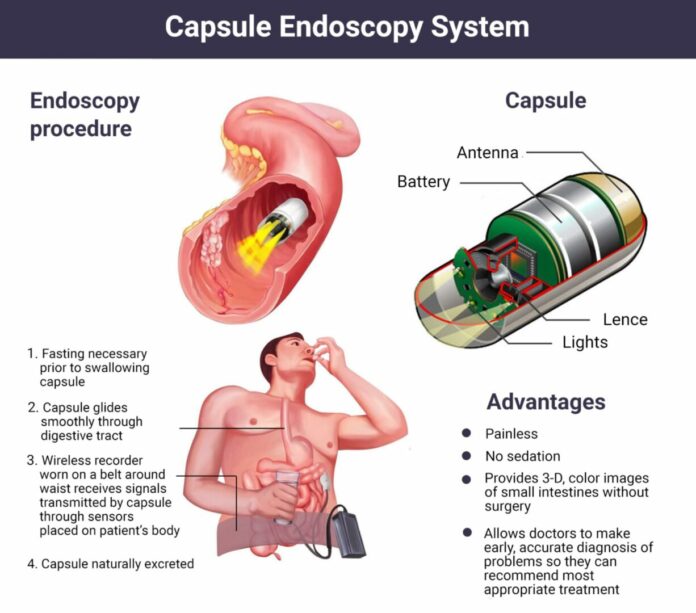There is good news for patients referred for endoscopy and colonoscopy procedures but are hesitant due to the intrusive nature of the procedures as Aga Khan University Hospital has introduced capsule endoscopy, a non-invasive way of conducting the two procedures.
Capsule endoscopy is a procedure that uses a tiny wireless camera to take pictures of your digestive tract. A capsule endoscopy camera sits inside a vitamin-size capsule you swallow. As the capsule travels through your digestive tract, the camera takes thousands of pictures that are transmitted to a recorder you wear on a belt around your waist.
Capsule endoscopy helps doctors see inside your small intestine, an area that isn’t easily reached with more-traditional endoscopy procedures. Traditional endoscopy involves passing a long, flexible tube equipped with a video camera down your throat or through your rectum.
What is endoscopy used to diagnose?
Your doctor might recommend a capsule endoscopy procedure to find out the cause for gastrointestinal bleeding, diagnose inflammatory bowel diseases, such as crohn’s disease, diagnose gastrointestinal cancers by showing tumors in the small intestine or other parts of the digestive tract.
Capsule endoscopy has also been approved to evaluate the muscular tube that connects your mouth and your stomach (esophagus) to look for abnormal, enlarged veins.
Factors that increase your risk of developing blood clots
People who have inherited syndromes that can cause polyps in the small intestine might occasionally undergo capsule endoscopy.
If the results of an imaging test are unclear or inconclusive, your doctor might recommend a capsule endoscopy to get more information.
What does the procedure involve?
Your healthcare provider gives you a capsule that’s about the size of a vitamin. Inside the capsule is a light, a transmitter and two tiny cameras. You swallow the capsule with water (just like you would take a pill) and then return to your daily activities. Your digestive system moves the capsule through your throat and stomach, into your intestines.
This specially-made capsule is sealed, so acids in your stomach can’t break it down like they break down food. The capsule stays intact while it travels through your body. The capsule’s cameras take pictures and transmit them to the recording device- usually left with the doctor.
You will also be given a mobile phone-size transmitting device to wear. They may attach wires from the device to your skin, your chest or abdomen, or may give you a wireless device that attaches to a belt. The device receives pictures from the capsule’s transmitter and stores them so your healthcare provider can review them later.
How do I prepare for the procedure?
Avoid eating and drinking. Your stomach needs to be empty for the procedure. Usually, you need to fast for about 12 hours before a capsule endoscopy. Your doctor may also order a bowel preparation before the test to clear your bowels.
It is also recommended to share your clinical history with your doctor, including any surgeries or problems you’ve had in your intestines. If you have any implant devices like a pacemaker or defibrillator, inform your doctor prior to the procedure because these devices might interfere with the capsule’s ability to transmit the pictures.
Tell your healthcare provider about any allergies you have or medications you take, including over-the-counter drugs, vitamins and supplements. You may need to adjust your dose or stop taking certain medications before the procedure.
What are the benefits of this test over traditional endoscopy and colonoscopy?
A capsule endoscopy spots bleeding and other problems in your digestive tract. It’s one of the only tests that help your doctor examine your whole small intestine and large intestines. Other diagnostic procedures (such as an endoscopic ultrasound) use a thin, flexible tube with a camera. But the tube can only reach the first six feet of your small intestine.
The procedure is also very safe and non-intrusive since only a vitamin-size capsule is what goes into your body as opposed to traditional endoscopy which involves the insertion of a whole tube through the mouth. With traditional endoscopy, a patient will need to be put on anaesthesia while a capsule endoscopy does not require a patient to be on anesthesia.
During a capsule endoscopy, the capsule travels through your entire digestive system. It covers more distance than a tube. The capsule can take pictures of your whole digestive tract, including your hard-to-reach small intestine.
What happens to the capsule in my body?
The capsule leaves your body naturally when you have a bowel movement (poop). This usually happens within 24 hours, but may take a few days for you to pass the capsule. You may see the capsule in the toilet, although some people don’t realize they’ve passed it. You can flush the capsule when you go to the bathroom.
Are there risks associated with this procedure?
Complications from a capsule endoscopy are rare. Sometimes, the capsule gets stuck in a part of your intestine that’s narrower than the rest of your intestines (stricture). This complication can happen in people who’ve had bowel surgery, inflammation or a tumor in the past.
If you aren’t sure if the capsule has passed, you may need an X-ray or CT scan to see if the capsule is still in your body. However, the doctor normally assesses your gastrointestinal tract in advance to determine your suitability for the procedure. In most cases, patients with narrowed gastrointestinal tract may not qualify for the procedure because this limits the movement of the capsule.









